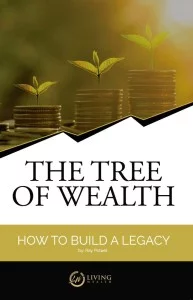Not all life insurance is created equal. In this episode, we discuss the biggest problems found in certain life insurance policies. And we’ll cover why you would never want to use them in your banking system.
Now, for those of our listeners who have been with us for a while, they know that we’re big fans of a particular concept. It’s called the “becoming your own banker” idea. It uses life insurance as a tool to practice banking in a brand new way.
But the problem is that there are so many different kinds of policies out there. We have people come to us who have these policies, and they want to know if they’re any good.
So we describe to you a few of the policies to avoid, especially if you’re doing this banking concept.
Life Insurance Policies to Avoid Discussed:
- Indexed policies
- Universal variable policies
- Term insurance
- Hidden servicing fees and cost increases
- Funny business with numbers
- The fine print costing you control
- What you’re agent needs to clearly explain to you
Want Financial Freedom?

Start your journey to financial freedom with this first step.
Get our 122 page eBook The Tree of Wealth here now.
Podcast transcript for episode 19: Life Insurance Never Use in Banking
Nate: Not all life insurance is created equal. In this episode, we’ll discuss the biggest problems found with certain life insurance policies and why you would actually never want to use them in your banking system. She’s Holly and she helps people find financial freedom.
Holly: He’s Nate. He makes sense out of money. This is Dollars and Nonsense. If you follow the herd, you will be slaughtered. Episode 19.
Nate: Okay, Holly. Now, for those of our listeners who have been around for a little while, they know that we’re big fans of a certain concept called the “becoming your own banker” concept. It uses life insurance as a tool to practice banking in a brand new way. We really enjoy it and it’s what you and I both use.
But the problem is is that there’s so many different kinds of life insurance out there. We have people come to us who have these policies and they want to know if they’re any good. What we want to do today is describe to you a few of the ones that you really want to steer clear from, especially if you’re doing this banking concept. So, I think that’s going to be the goal today. So, Holly, what are some different types of policies that exist?
Holly: There’s indexed life insurance, there is universal variable life insurance, there is paid up 10 year pay, there’s paid up to 65, a variety of different life insurance policies. A lot of people really go towards the universal life, or the universal variable life, or the indexed policy because they believe it’ll give them a higher rate of return on their money or they’re sold a belief that it gives them, once again, that rate of return, that it’s going to yield a percentage higher than 4%, so it’s going to be somewhere around 8, 9, 10%. Now, what are the problems with those type of policies, Nate?
Nate: The biggest one that I think you and I probably run into is the new kid on the block. That is indexed universal life insurance. That’s the one that’s probably the most recently built and it’s the one that is being sold quite heavily in the whole life world. So, that’s the one I think that we could focus on.
As you said, Holly, there are variable life insurance policies. Those are policies that are actually, your money is invested directly in the stock market. So, there’s some issues with variable universal life that we may not even get into because they’re pretty much the same with indexed universal life and in basic universal life insurance as well.
None of those are the ones we want to use and there’s a few reasons for that. With the indexed universal life, I’ll tell you guys, for those of you who have no idea what that is, universal life is essentially, a term insurance policy is what it’s built on. But it’s got a side fund of some sort of interest bearing account. So, universal life, that’s just simply like a savings account that earns interest.
Variable life, that side fund is in mutual funds, mostly in the stock market. Indexed universal life is said to give you returns that follow a stock market index, but they normally cap you at a certain level. They say, “If indexed goes over 12%, we’re going to cap you at 12%.” But they also say that there’s a floor. That’s the big selling point is that, “Hey, even if the stock market has a crash, we’re going to have a 0% floor, so you’ll never lose money. You can participate in some higher gains, but you’ll never lose money.”
But there’s some problems with that, Holly. It sounds great, feel like, “Man, I can make good money, but I don’t have to lose it all in a bad year. That sounds awesome.” But some of the problems with all universal life, but especially IUL, the first point I wanted to make is that the internal costs are not guaranteed.
So, there’s cost. Yeah, there’s cost to life insurance. With an IUL policy, the risk is more on the policy holder than it is one the company because the company has the right to increase the cost of the policy at any point. So, that is a very scary position to be in because if they have to keep crediting you, let’s say, a big high game because the market is doing really well, the money’s not invested in the market, Holly. It’s not actually in there.
So, they’ve got to come up with the money in their fixed accounts, for the most part, is what they use. There’s no way they can return that type of return, so what’ll they do to offset that? They’ll just increase your costs. So, they can tell you that you’re making a good return, but the costs are eating away at it, so it doesn’t actually pan out that way. It may not happen, but they have the right to do that, which is a very scary thing.
Holly: It’s actually called servicing fees. They used to not have to disclose what those servicing fees are, or that cost is. Now they actually do have to disclose it. I’ll be honest with you, Nate, and tell you that I had clients that they were putting around $35,000 a year into an indexed universal, yet their servicing fees was $8,000.
Nate: It’s sold so well, but it’s like the fees, they like to brush over those. The fees, since they’re not guaranteed, you’ll find that there’s people, especially people who bought normal universal life before IUL was even around, so first off, that’s a bit scary. It hasn’t been around for all that long.
Holly: Less than 35 years.
Nate: Yeah. 25, maybe. 20, 25. It’s the newest kid on the block in the insurance world. Remember, insurance companies design products that they think are easy to sell. That’s the whole goal. IUL may or may not be good, but the whole goal of the policy wasn’t just to help clients, necessarily. It was to help their agents sell more policies. They make it sound so good. But when you look at it, it may not really end up being that good, because not only are the internal costs, like the service fees you said, Holly, but the mortality charges are also not guaranteed.
It’s term insurance, so every year, that term insurance side of it, the cost of insurance goes up and up and up. When you’re 75 years old, if the returns that you’ve received in that policy aren’t what they thought it was going to be, you could actually be losing money because the mortality costs can get so high.
Holly: Really, in reality, the numbers that they’re giving you are not real numbers. They have the non- guaranteed side, but it’s interesting to read on the bottom of a illustration that it very clearly states these are projected numbers only, meaning they’re not guaranteed like they said.
But they’re projections; they’re projecting and predicting how the stock market’s going to work, what they’re going to have to have the fees of servicing are in order to give you an idea of, “Oh, this looks really good because the projected numbers look so great.” But it doesn’t take into account the hidden fees, the mortality rate, the cost of the term insurance, and all of that. Eventually, what happens is it gets so expensive, a client can’t afford it anymore.
Nate: Yeah, and that won’t happen to everybody, Holly, but it’s happened to enough people to scare me. That’s all I can say. It may not happen to everybody, but it happens to enough people. There was, I think it was an ABC News report that went into, I think, more of a retirement community in Florida. They were talking and they interviewed a few people who were actually losing their universal life policies because the company had recently voted to increase the mortality costs and they hadn’t had enough money built up. The interest wasn’t large enough to pay for the increase, so their cash value’s decreasing, decreasing.
Sooner or later, the policy will implode and they’ll lose it. That’s the issue with universal life is it may turn out okay, but that’s not really up to you. I don’t want it to be up to somebody else if I’m going to succeed. The insurance company has the control of the policy to determine what they’re going to cap you at, so they can always drop the cap.
They can drop what’s called participation ratios, how much of your money can participate in those gains. They can increase mortality costs, they can increase service. They are the ones in control here, and so your success is definitely not guaranteed whenever you’re using an IUL policy or something similar.
Holly: One of the keys that we keep saying is that you want to do what banks do. Banks don’t buy these policies and there’s a reason why, because they can’t control what happens to that policy due to the guarantees and all the things that are given control over to the insurance company. It’s like taking your money and putting it in an investment, but you don’t know how it’s going to perform. You don’t know really what the fees or costs are because it can change at any point in time.
You don’t know if it’s going to be around longterm for you or if it’s just going to get to a point where you can’t afford it. Really, what you want to create is a system where you have complete control of your money, and it’s a closed system where you know what’s going to happen and the servicing fees and the mortality rates aren’t changed on a whim, basically by board of directors.
But actually, you would have a say in that, and you don’t with the indexed universal life policies at all. You’ve just given your money over to somebody else and told them, “Do what you want with it,” and hopefully it works out good.
Nate: Yeah, and one of the things they always say is, “You can’t lose money in the market because the money’s not invested in the market; it’s just following an index. We give you interest based on how the market does.” So, they give you this impression that you can’t lose money. But people lose money in IUL all the time because the fees are so high, if the market goes zero and the floor is 0%, guess what? Your account didn’t grow by very much, if anything at all, especially if the floor is 0%. It didn’t grow by anything on the cash value.
But guess what? You still had to pay for the servicing fees, the agent’s commission, the mortality cost, the annual fee for the policy. You had to pay all these fees, but you had no gains to show for it. So, they make it seem that you can’t lose money doing it, but yeah, you definitely can lose money in a down year because the money just simply won’t grow enough to eat up the costs, which means next year, you’ve got less cash value to use than you thought, which means if the market does that a few years in a row, you’re paying even more for the mortality than you should be because the cash value hasn’t kept up. When the cash value doesn’t keep up, there’s more at risk, so that expenses increase.
It’s just salesy. It’s just slimy. I don’t understand it enough. People don’t understand it enough. There’s just so much variables that can make or break you.
Holly: For me too as a life insurance agent, Nate, I think most of the time we get a bad rep and a bad name. But really, in all honesty, with an indexed universal life, the agent is almost always paid irregardless of what’s happening to the customer who bought the policy. So, all those people that, in Florida even, that lost that mortality rate because of the interest, the agent got paid. For me, that’s a really hard sell that no matter what happens, the agent is being paid and the client might not have anything.
Nate: There’s two big reasons for me that I just avoid IUL for the most part and try to get my clients to avoid it to a certain extent. Number one, who’s in control? Is it you or is it the company? At any point in time, at the discretion of the company, anything that they told you, almost everything can be changed drastically: the expenses, the participation ratios, the caps, all of those things can be changed. So, there’s no way to calculate what the outcome might be or what the outcome will be.
As you said, Holly, it’s all based on what they think will happen, projections. If you follow the guaranteed side, which I think the guaranteed side for most has maximum expenses and minimum interest crediting, they always implode. So, they’re counting on the fact that their expenses won’t be the max and the returns will be the projected returns in the market, which nobody really knows. So, that’s a big deal.
The overall issue is that the risk is shifted back to you, not away from you. I buy a policy because I want to make sure I have no risk and I’m in total control. In IUL, you’re taking a risk. You’re risking a few things that we’ve already mentioned between what the expenses will be, what the market will return. That’s not a good place to be if you’re building your bank on it.
Holly: Nate, too, in all honesty, when you can’t control the outcomes, the mortality rates, the servicing fees, and all that, what you will discover over time is you could end up paying more just to maintain that policy than you would in actual taxes. If you’d just taken that money and paid the IRS their taxes, you’d probably still have more cash than if you put it into the life insurance company and the mortality rates get so high or the servicing fees get so high that you’re actually giving more over to the federal government and the IRS than you would if you’d just paid them.
You give that to the insurance company vs. just keeping it and investing it and you got a loss or you get to deduct that loss from taxes because really, inside an insurance company, it’s a loss. But it doesn’t really affect you in the sense of, financially, you’ve made a decision to put it in the life insurance company and you thought it was a good product that would provide for your family and you could use it and bank on it because that’s what a lot of people say. “It’s cash. It’s cash. You can use it as a banking policy.” But really, you can’t because you don’t control the gain of it. You don’t control what you actually receive. You have no control.
Nate: Exactly. That’s the biggest issue I think you and I both agree with is the lack of control. I want to be totally in control of my bank. I want to know with very high a rate of certainty what I’m going to get myself into with this policy and what I’m going to get out of this policy and how I can use it. That’s another thing. Of course, IUL policies have cash value that you can borrow against that people liken to the “becoming your own banker” process that we do with the policies we want you to have.
The problem with borrowing is, once again, we want to be able to make sure that we can recapture the interest. If you have no idea how much money your policy’s going to grow by, because all these things are variable, you can use it and maybe you make money, maybe you don’t. I don’t want to be in a position where I might make money or I might not. I just want to say, “Okay, this is the way a system works and it’s worked like this for hundreds of years and I know exactly what I can do to build the policy and how I can use it to make money,” and I don’t get that same confirmation with a universal life policy, especially indexed universal life.
Holly: We’re going to take a short commercial break, and when we come back, we will finish up this episode and get on to the next one.
Are you tired of being stressed about money? The Dollars and Nonsense podcast is sponsored by Living Wealth. Visit LivingWealth.com/freedom to get your free Smart Money ebook and sign up for a personal wealth presentation today. Living Wealth is a family owned and operated business, which works with individuals, families, and even businesses to slay the money stress dragon.
Our clients received individual coaching regarding wealth creation and how to create a retirement income. You’ll be enabled to have cash today and in the future. Since 1972, Living Wealth has been committed to educating smart people on basic money principles to assist them in becoming debt-free and finally find financial freedom. Let us help set you free. Remember to visit LivingWealth.com/freedom to receive your free ebook and even sign up for an individual wealth presentation today.
Okay, Nate. We’ve been discussing really indexed universal life insurance. The biggest reasons you and I don’t like it is the control, that you really have no control, and we want guarantees. Most of us, if we think about it, we haven’t really lost money unless we gave over control of that money to somebody else and told them that we thought they could do better with our money. So, really, you want to create a system that you can control your money and that you actually have value and you totally understand what you’re buying and why you’re buying it.
You don’t want to look at something and have projected numbers or what they think is going to happen, but really, in reality, if you look at the guaranteed, like we were saying, with the maximum fees, maximum mortality, all of those variables that they can change, it implodes. The reason why you want to understand that is so that you don’t make a wrong decision and buy a policy thinking, “This is going to work for me and I can use the cash value or I can provide for my family later on,” and find out that you’re 75 and you don’t have any death benefit and you have no cash anymore.
Nate: Exactly. That’s scary. As far as IUL, all universal life has those issues. So, regular universal life policies. Everyone in the marketplace practically agrees that regular universal life, if you’re looking at cash value, is probably even going to be worse than IUL. Then the problems with variable universal life are really the same.
Banks can invest in the stock market directly. Why would you want to with your bank? So, that’s all variable is, is it actually is directly invested in the stock market. So, you got to pay all these fees, you got to pay all the mutual fund fees, and then you’re also hoping you can overcome the fees and profits. So, once again, it’s not a good place to build the banking system that we want to build with it. I just would steer clear of those. Avoid them like the plague if you’re wanting to do banking. Okay?
If you don’t want to do banking and you’re just going to let money sit, you probably won’t work with us anyway, so that’s fine. Buy whatever you want. But if you’re going to be doing banking and moving money, I wouldn’t use those. In fact, one of them, we use whole life, but we’ve designed it a certain way. Holly, I would even throw whole life policies without a PUA rider into the mix of bad policies that may probably not work all that well for banking.
Holly: They really don’t, Nate. I was just looking at one the other day with a client that’s put in money for the last 13 years. Not only does her death benefit not grow by what she’s putting in, but her cash value doesn’t even grow by what she’s putting in out of pocket annually. So, she’s putting a significant amount of money in and yet her death benefit doesn’t grow.
I’m just going to use simple terms. Let’s say she’s putting $2,000 a year in. Her death benefit isn’t even growing by $2,000, but she doesn’t even have $2,000 growth in her cash value to borrow out. She’s actually losing money at this point, 13 years into a whole life program. She doesn’t even have the money that she put into the policy back and the amount of death benefit she has for what she’s put in is greatly reduced. She doesn’t even have $150,000 of death benefit.
For somebody that started at 23 years of age, this is, to me, it’s criminal almost that it’s not working for her. She bought believing she was doing something good, that she needed whole life insurance, she didn’t want something to expire, that it was a good investment, basically, or a good rate or return on her money. When I actually sat down and explained it, she was stunned. She just didn’t even know what to do at that point.
Nate: Yeah. That’s what we find. So, there’s a certain type of policy and there’s a certain way to build that type of policy that just happens to magically work out the best when you’re doing this whole banking concept that we love. That’s what we want to focus on, actually in our next episode. We’re going to delve into what is the right policy, how to build that policy, and then also, what about that policy actually works.
So, we’re going to do that in our next episode. Sorry to leave you guys on a cliffhanger, but we’re running out of time anyway. So, Holly, do you have anything else you’d like to say before we close this one down?
Holly: The only thing I want to do is say investigate what you’re buying and why you’re buying something. Make sure that even if you’re buying a life insurance policy that the insurance agent can explain the difference between the projected numbers or guaranteed or non-guaranteed. Find out how old that is.
For us, because we do banking, we want to mimic banks. So, my biggest reasons why you don’t buy the other products is because banks don’t buy it. Banks, I truly believe, are in the money business. So, if they’re not buying it, why should you buy it? Do they know something you don’t know?
If the agent is constantly going to be the one receiving the payment and getting paid those commissions, irregardless of how the policy performs for you, that might be a red flag of, “Maybe this isn’t the perfect policy for me. If I can’t control it and I don’t know what that guarantee is, maybe I don’t want to buy it.”
Nate: Exactly right. Thanks, Holly. This has been Dollars and Nonsense. If you follow the herd, you will get slaughtered.
Holly: Get free resources and transcripts from this episode by visiting LivingWealth.com/e19.









